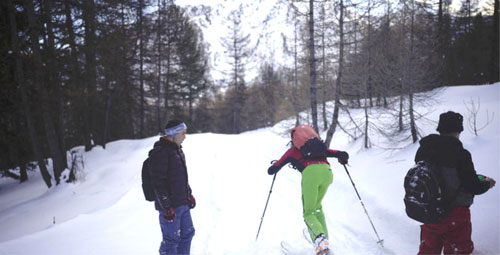When suicide attackers and gunmen massacred crowds flocking to Kabul’s airport, they also sev-ered the escape route that Ali Rezaie hoped would take him to a new life abroad, far from the Taliban and their suspicions of well-educated, middle-class people who worked with foreigners in Afghanistan.
In the chaos, Rezaie couldn’t reach the airport where flight after flight took off without him. The 27-year-old was left with no choice but to take his future into his own leathery hands. Like many other Afghans, he resolved to find another way out and embarked on a forbidding journey of thousands of kilometers to Europe, large parts of it on foot.
More than three months later, Rezaie’s odyssey through five countries has carried him high into the French-Italian Alps, where he is pushing through knee-deep snow to evade border guards, with a journalist from The Associated Press in tow.
The Afghan exodus that some feared would flood Europe with migrants after the Taliban swept to power hasn’t materialized. And amid the toothy Alpine crags bristling with icicles, it quickly be-comes apparent why: Only the hardiest, most driven and most resourceful exiles make it this far.
Ahead of Rezaie in the snowscape is the French border, unmarked but guarded around the clock by police who peer through thermal binoculars for heat signatures.
Rezaie’s companion, another Afghan bearing scars from a suicide bombing that prompted him to flee, had already tried — and failed — to reach France via this wintry route.
So the Afghans advance carefully. They pause to listen for sounds in the frozen silence, to consult a map on Rezaie’s phone before the chill kills its bat-tery and to munch on jam-filled croissants they bought in the frontier village of Claviere in Italy.
If caught by French guards patrolling the border on foot, ski-bikes and in vans, Italy is where they’ll be forced to return.
The Taliban takeover and the swift collapse of Af-ghanistan’s economy has sent people streaming illegally into neighboring Iran, which is often the first stepping stone for Afghans — including Rezaie — who push on into the European Union. Afghans are now on course to overtake Syrians as Europe’s leading asylum-seekers in 2021.
Internal EU reporting on migration trends shows that more than 80,000 Afghans applied for asylum through November. That’s a surge of 96 percent over the same span last year, and the increase was partly driven by the evacuations from Kabul airport. Rezaie, from Herat in western Afghanistan, says he traveled to Kabul in search of a flight but then dou-bled back after the suicide bomb and gun attack in the waning days of the airlift.
He believes he would have been killed had he stayed in Afghanistan be-cause of work he did with foreign aid groups. So he emptied out his savings, borrowed money and left behind his printing company, friends and com-fortable life. The quest took him first to Iran and Turkey, then onward by boat and for 25 days on foot into Greece. —Agencies










